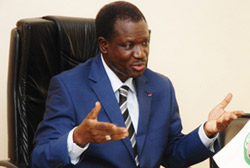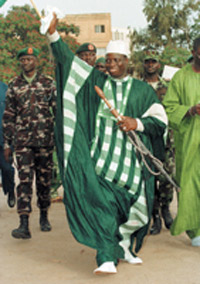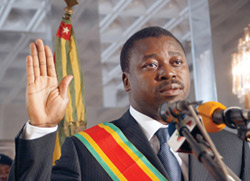DEAD ON ARRIVAL
07/13/15, Modupe Ogunbayo

ECOWAS president Kadré Désiré
Ouedraogo
ECOWAS wants term limit for presidents in the region but it is an idea that's quickly shut down by sit-tight leaders.
The powerlessness of the Economic Community of West African States (ECOWAS) was again laid bare at its summit in Ghana last May when it failed to reach an agreement on a plan to limit the term of office of presidents of member-nations to two. Unsurprisingly, the countries which objected to this progressive idea were the usual culprits of the sit-tight syndrome that is so common in Africa. Togo and The Gambia, with presidents who have been in power for a long time, stiffly opposed the idea.
Most west African countries have two-term presidential limits specified in their constitution but the region is the biggest violator of this democratic principle in Africa. Affected leaders often argue that countries have different political peculiarities so there cannot be uniformity on the matter.
The UN west Africa representative, Mohammed Ibn Chambas, backed the ECOWAS plan while accurately noting that the situation was triggered by Burkina Faso's ex-President Blaise Compaore's vain attempt to effect a constitutional change to permit a third term. Togo's and The Gambia's objection truncated the proposal.
"This dissenting view became the majority view at the end of the day," Reuters news agency quoted Ghana's Foreign Minister Hanna Tetteh, as saying. In ECOWAS' characteristic nature the plan was deferred till an unspecified date for further consultation.
Some angry commentators are, however, chagrined at the "coup" perpetrated by the two nations and want them kicked out of ECOWAS regional bloc with the attendant loss of multilateral benefits, common trade agreements and travel benefits, in order to salvage the plunging influence of the regional body. But the reality of this position is very far from being actualised at the moment.
Ibn Chambas' observation about Compaore's involvement is perceptive. The revolution that precipitated Compaore's exit from office is creating similar ripples in neighbouring nations. This narrative's significance lies in the revelation that hope lies not in ECOWAS but in multitudes of disenchanted youths in these affected nations who would be drivers of the needed change from the sit-tight syndrome affecting their nations' rulers. The youths who have been suffering from poverty and marginalisation are increasingly becoming aware of the power in employing street protests as the only way of bringing change.
Compaore's determination to remove Article 37 of the Burkina Faso's constitution and his refusal to step aside despite massive protests, led to a massive 500,000 youth-driven demonstration at the place the people renamed "Revolution Square". Strategically, these people marked out top politician crucial to the tenure elongation bid and planned to prevent them leaving their houses, similar to the Senegalese who scuttled President Wade's tenure elongation legislation from getting passed by blocking legislators from leaving their houses and voting in support of Wade's bid.

President Jammeh of The Gambia who
has ruled his country for decades wants
no term limit for leaders in the west
African sub-region
Compaore got wind of this plan and immediately moved all the legislators to the Independence Hotel the evening before the crucial deliberation on elongating his term of office. The hotel, shares the same wall with the National Assembly. Thereafter, the army cordoned off the hotel and the National Assembly. Compaore happily slept that night confident about his full-proof plan. By 6 a.m. however, over one million Burkinabe turned up and marched towards the National Assembly regardless of the heavy security at the venue. The beleaguered army could neither kill one million people nor let them through. The security cordon was simply overwhelmed by the rampaging multitude. The assembled legislators wisely scampered out by the back doors where they scaled the hotel's fence to escape the angry mob. Their might crumbled before people power as the protesters burnt down the National Assembly plus all the houses of known Compaore's family and business associates.
Shortly afterwards, the Minister of Transport Moumouni Guiguemdé, was forced to resign due to corruption allegations and the discovery of his past criminal past in the United States. He was the second minister to be forced out of office.
At the moment, agitation is mounting against the transitional parliament, which is being accused of receiving scandalously high salaries of about $3600 monthly. The civil society members too are getting daily insults for accepting such huge salaries.
Burkina Faso is definitely living up to its radical history. In 1983, Captain Thomas Sankara took over power and established a radical political and economic agenda for the country he renamed Burkina Faso, meaning People with Integrity. His comrade, Blaise Compaore, however, assassinated him, took over power and ran a regime of corruption and impunity for 27 years until the people decided to overthrow him. The common rhetoric during the protests showed the Burkinabe never came to terms with Sankara's assassination and resented Compaore for it while craving change. This longing was however, made stark by the realisation of its impracticality under Compaore's human rights' abuses and manipulation of the political system.

Togo's President Faure Gnassingbe is
opposed to term limit for west African
leaders
However, the people-styled "democracy museum", displaying the completely destroyed home of Francois Compaore, Blaise's junior brother known as the "little president", is the Burkinabes' method of saying "never again". Francois was the administration's political strongman and potential successor to his brother who has no male children. He came into infamy 16 years ago over the murders of a journalist Zongo and his own driver, David Ouedraogo. Ouedraogo reportedly witnessed sacrificial killings in "Little President's" house and attempted leaking the story to Zongo. The journalist's charred body, alongside those of his three companions, was found in a car. The incident triggered street protests by outraged pro-democracy advocates. Francois was charged with "murder and harbouring the stolen body" of Ouedraogo, but the charges were later dropped and members of the presidential guard convicted for the journalist's murder instead. This did not pacify the people who bided their time and effectively struck when Compaore least expected.
This example underscores yet again the blindness of dictators to the empirical certainty that the stubborn and sustained reaction to oppression from the rulers by the ruled is universally inevitable. Compaore's leading political allies had advised the Vladimir Putin's formula: step down, nominate one of them to vie instead so that their collective interest could be preserved until an auspicious time arrives for his re-emergence. He refused. Most of his close associates were apparently stung by his lack of trust and therefore resigned from his government to join the opposition in January 2014. He was unfazed because he had the resources to manipulate the legislators and get their support. He lost to people power in the end.
As for the Gambia and Togo, peoples' anger seems suspended for now, undoubtedly helped by enshrined laws that make abnormality the new normal. Gambia's presidential tenure of office in section 63 of its laws flexibly allows a president to continue manipulating his continued stay in office because: "(1) the presidential term of office shall, subject to subsection (3) and (6), be for a term of five years..." Subsection (3) says a president may at any time during his term of office be removed from office if "a no-confidence motion is passed in the National Assembly supported by two thirds of the members of the National Assembly." Subsection (6), says: "where the life of the National Assembly is extended for any period in accordance with section 99 (2), the term of office of the president shall be extended for the same period."
Togo's constitution is even more ambiguous. Title IV of the Executive Power says "the President is elected by universal, direct and secret suffrage for a mandate of five (05) years. He is re-eligible. The President of the Republic remains in office until the effective taking of office of his elected successor."
Togo's President Faure Gnassingbe has been in power since 2005 and won a third term in office last April. His father, Gnassingbe Eyadema, ruled Togo from 1967 till his death in 2005. Afterwards, his loyalists ensured Faure's emergence as president. Gambian President Yahya Jammeh is near the end of his fourth term in office after coming to power in a coup in 1994. Yet, Jammeh told the BBC in 2011 that presidents should be judged on what they do in power not by the length of time they have been in office. "I will deliver to the Gambian people and if I have to rule this country for one billion years, I will, if Allah says so," he said.
Comment on this story



